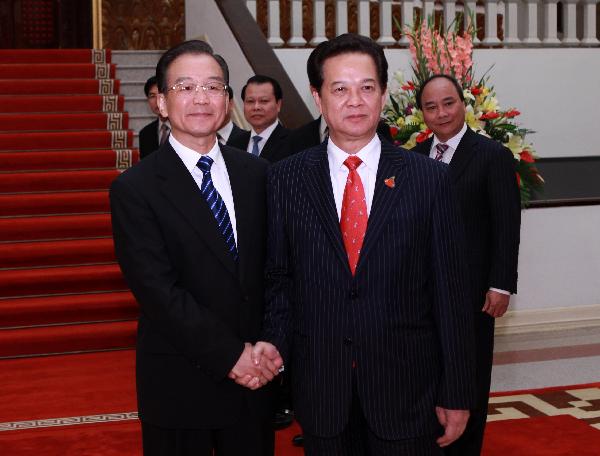Foreign and Military Affairs
Premier seeks good South China Sea result
By Qin Jize (China Daily)
Updated: 2010-10-29 07:24
 |
Large Medium Small |
HANOI - Visiting Premier Wen Jiabao emphasized the importance of a proper resolution to the South China Sea dispute on Thursday, saying it is crucial to the healthy and stable development of Sino-Vietnamese ties.
Wen said he is looking forward to the early negotiation and signing of a principal guideline to resolve maritime disputes between the two neighbors.
|
 Vietnamese Prime Minister Nguyen Tan Dung (R Front) meets with Chinese Premier Wen Jiabao in Hanoi, capital of Vietnam, Oct 28, 2010. [Photo/Xinhua]? |
Wen made his remarks while meeting with his Vietnamese counterpart Nguyen Tan Dung ahead of a series of leaders' summits of the Association of Southeast Asian Nations (ASEAN).
He said the two countries have established negotiation mechanisms on solving the South China Sea dispute, and that Beijing is willing to keep high-level contacts with Hanoi.
Wen suggested establishing a hotline between the two capitals to maintain and promote common interests.
Healthy Sino-Vietnamese ties, Wen noted, are essential to the two countries - and the region at large - against a background of such complicated international situations and changes in Asian power structures.
Territorial disputes have emerged between China, Vietnam, the Philippines, Brunei and Malaysia in the South China Sea since the 1970s.
But more recently, the conflict in the region has been further complicated after Washington waded into the dispute in July, asserting it has a national interest in resolving claims over the islands in the South China Sea.
In 2002, China and the 10-member ASEAN adopted a Declaration on the Conduct of Parties on the South China Sea, laying a political foundation for a possible future commercial cooperation between China and ASEAN nations as well as long-term peace and stability in the region.
And analysts believe the mainstream of bilateral ties remain positive and healthy, despite current rift on the South China Sea.
"The friendship between China and Vietnam is long cherished by the majority of Vietnamese, because the two countries have historical ties and share similar values," said Chu Hao, a researcher on Vietnamese studies at the China Institutes of Contemporary International Relations.
Likewise, Beijing highly prizes its relations with Vietnam. Indeed, China has "provided assistance to Vietnam for the past decades on infrastructure programs - notably on transportation and electricity", said Chu.
The caution of China's rise has become the crucial factor to put the territorial dispute on the agenda, he said.
"The South China Sea issue is now addressed under a multilateral framework, as the US and Vietnam share common interests in offsetting the growing influence of China on the region," Chu said.
But it is unwise for Vietnam to do so, according to Chu, as it will not only complicate the issue, but further damage bilateral ties.
"High-level exchanges have been halted since 2009, and Chinese enterprises are currently hesitant to invest in Vietnam for fear of the escalation of the conflict," Chu added. "This is obviously contrary to the core interest of Vietnam."
But according to Wang Yuzhu, an expert on ASEAN studies at the Chinese Academy of Social Sciences, the dispute is unlikely to undermine fundamentally robust cooperation between China and Vietnam, which has already served as catalyst for a win-win situation for both sides.
He Wei contributed to this story.











